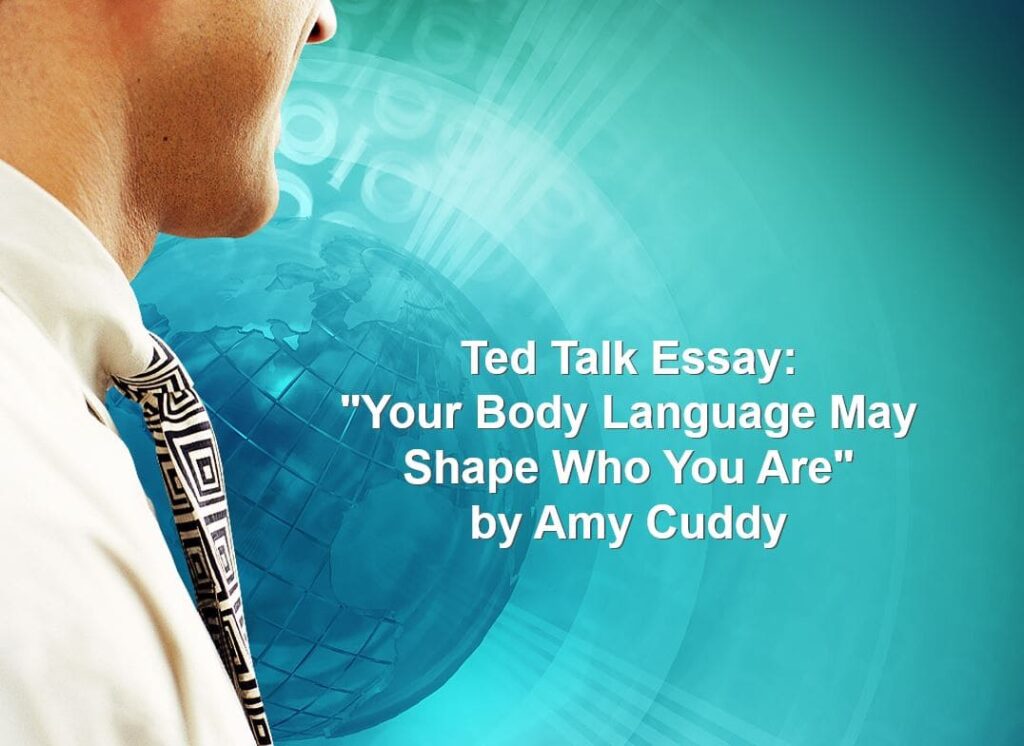In this Ted Talk essay on “Your Body Language May Shape Who You Are” by Amy Cuddy, the author explains the concept of power posing. Cuddy explains that it influences the feeling of dominance, confidence, and assertiveness. Several studies have been conducted to replicate her research findings. Power posing impacts personal experiences and behavioral outcomes when applied in evaluative situations despite the controversies on its hormonal effects.
The Main Theme of the Video
The main point that Cuddy makes in her talk is that power posing or body language influences the feeling of power. Pretending to be powerful or holding expansive power poses makes one feel more powerful (Cuddy 07:42-07:50). It makes individuals feel more confident and evaluate themselves positively. As a result, power posing influences the behaviors of individuals.

My Personal Experience
I can relate the video to my personal experiences. Based on the results of the experiment conducted, Cuddy found that high-power posers are more likely to be evaluated positively during job interviews (14:47-14:55). Through personal experience, I have found that pretending to be confident or powerful during job interviews, public speaking, and classroom presentations leads to better outcomes. Hence, the concept can positively impact people in different ways.
Video’s Importance
Power posing is important in helping people feel more confident and powerful. It helps people to feel more relaxed, confident, and dominant (Chatterjee 130). Holding high power poses leads to an increase in testosterone hormone levels, which increases the feeling of power. It leads to a decrease in the stress hormone or cortisol. Power posing is important during evaluative social situations.
Surprising Fact
The thing that surprised me was that holding power poses for two minutes led to notable hormonal changes. In the experiment conducted by Cuddy and her team, high power poses led to a 20% increase in testosterone hormone levels and a 25% decrease in cortisol hormone levels (11:37-12:07). Surprisingly, these hormonal changes happened after holding power poses for only two minutes before a job interview. However, the concern is that some researchers have been unable to replicate the changes in cortisol and testosterone hormone levels (Metzler and Grèzes 3). The relationship between power posing and hormonal changes is complex and difficult to understand. Therefore, more research is needed on the hormonal effects of power posing.
Summing Up
In conclusion, power posing impacts the feeling of power and influences behavioral outcomes when applied in evaluative situations. Applying power posing has helped me to achieve better outcomes during interviews and public speaking. Moreover, high power posing makes people feel more powerful so that the concept can be applied during evaluative situations. The finding that power posing for two minutes can have hormonal effects is surprising, but more research should be done due to controversies in research findings.
Works Cited
APA. “Standing Tall and Standing Wide: Body Positions Have Effects on How People Feel.” American Psychological Association, 2022, www.apa.org/pubs/highlights/spotlight/issue-239.
Chatterjee, Sumedh. Theatro Plasticity Method – TPM. StoryMirror Infotech Pvt Ltd, 2020.
Cuddy, Amy. “Your Body Language May Shape Who You Are.” TED, 2012, www.ted.com/talks/amy_cuddy_your_body_language_may_shape_who_you_are.
Metzler, Hannah, and Julie Grèzes. “Repeatedly Adopting Power Postures Does not Affect Hormonal Correlates of Dominance and Affiliative Behavior.” PeerJ, vol. 7, 2019, pp. 1-18, doi:10.7717/peerj.6726.


